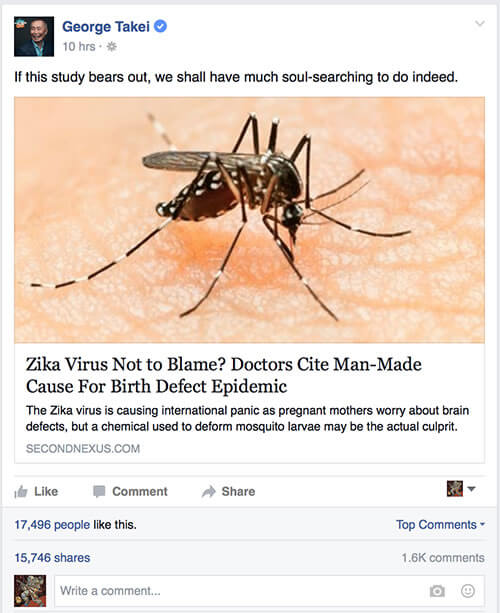The GLP aggregated and excerpted this blog/article to reflect the diversity of news, opinion and analysis.
Some people are just prone to conspiracy belief. Unfortunately, sometimes people who have a better track record also screw up. In this case, I’m referring to George Takei, who rose to fame as Hikaru Sulu, helmsman for the U.S.S. Enterprise in the original Star Trek series. In recent years, Takei has gained prominence as a gay rights activist and icon, as well as a social media juggernaut, with 1.8 million followers on Twitter and 9.5 million Likes on Facebook (including me).
But yesterday, I was disturbed to see this pop up on my Facebook feed:
The article blames the microcephaly cases in Brazil on Pyriproxyfen, a pesticide manufactured by Monsanto’s partner Sumitomo Chemical that is effective against a wide variety of arthropoda (insects). I will give these cranks props for figuring out a way to blame Monsanto for the microcephaly suspected to be caused by Zika virus without mentioning GMOs. Well played, Second Nexus, well-played. Not so well-played, Mr. Takei. Not so well-played in falling for this.
What we’re seeing is yet another example of leaping to infer causation from correlation, just as I discussed when antivaccinationists noted that in 2014 the Brazilian Ministry of Health also started recommending that pregnant women receive the Tdap vaccine between weeks 27 and 36 of pregnancy. The result has been a whole boatload of antivaccine conspiracies blaming the increase in microcephaly on the Tdap vaccination. One can’t help but wonder what else the Brazilian Ministry of Health did in 2014 that cranks can blame microcephaly on.
Read full, original post: Oh, myyy! George Takei falls for a Zika virus conspiracy theory
































